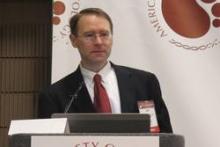NEW ORLEANS – A majority of patients with aggressive, treatment-refractory lymphomas had a complete or partial remission after being treated with chemotherapy and T-cells engineered to target the CD-19 receptor, National Cancer Institute investigators reported here.
In a study of 15 patients, 9 of whom had aggressive large-cell lymphomas and 6 of whom had indolent B-cell malignancies, 6 of 13 evaluable patients had a complete remission, 6 had a partial remission, and 1 had stable disease, said Dr. James N. Kochenderfer, an investigator in the Experimental Transplantation and Immunology Branch at the National Cancer Institute in Bethesda, Md.
One patient who, despite having undergone 10 prior therapies -- including 3 rituximab-based chemotherapy regimens -- continued to have lymphoma involvement of the liver and other abdominal areas, remains in complete remission 9 months after treatment with a chimeric antigen receptor (CAR) targeting the B-cell antigen CD19, Dr. Kochenderfer said at the American Society of Hematology annual meeting.
"We’ve chosen to focus on the aggressive large-cell lymphomas, because patients with these lymphomas, such as diffuse large B-cell lymphoma and primary mediastinal B-cell lymphoma, have a very poor prognosis if they are refractory to chemotherapy," he said in a briefing prior to his presentation of the results in oral session.
Commenting on the CAR-T cell strategy, Dr. Laurence Cooper of the University of Texas MD Anderson Cancer Center in Houston, who moderated the briefing, noted that "these patients were mortally wounded – they were all going to die, except that these types of engineered T-cell therapies rescued the patients."
The NCI investigators genetically modify each patient’s T-cells in vitro, using a gammaretroviral vector to induce in the cells expression of an anti-CD19 antibody. The process takes 10 days, during which time the patients receive cyclophosphamide and fludarabine to deplete their endogenous leukocytes.
"There’s extensive evidence in multiple animal models and also in humans that shows that depletion of endogenous lymphocytes dramatically enhances the activity of adoptively transferred T-cells. In mouse models, it’s absolutely critical for effectiveness of these CAR T-cells," Dr. Kochenderfer said.
The patients are then infused with the anti-C19-CAR transduced T-cells.
The investigators thus far have treated 15 patients with the technique, including, as noted before, 9 with chemo-refractory large cell lymphomas.
Treatment toxicities included hypotension and neurological toxicities such as confusion, delirium, and transient aphasia.
"Another thing about this therapy that’s amazing is that the patients do become sick; we previously published that the toxicity correlates with serum cytokine levels. [However] they recover very quickly: they can go from being incredibly ill to completely feeling almost normal within 2 days," Dr. Kochenderfer noted.
He and his colleagues also have used the technique in 10 patients who had persistent B-cell malignancies or other cancers following allogeneic stem cell transplantation as an alternative to donor lymphocyte infusions, which have shown inconsistent efficacy and are associated with significant risk for morbidity and mortality for graft-versus-host disease (GvHD).
Of 10 patients treated to date, 3 had "substantial regression" of their malignancies, and one patient with chronic lymphoctic leukemia (CLL) is still in complete remission 12 months after treatment. Another CLL patient had tumor lysis syndrome as he experienced regression of CLL in his bone marrow, blood, and lymph nodes. A patient with the notoriously treatment-refractory mantle cell lymphoma had a partial remission.
As in the first study, toxicities were manageable and consisted mainly of fever, hypotension, and B-cell depletion. No patients developed GvHD after infusion of the altered T-cells.
The study was funded by the National Cancer Institute and by Kite Pharma. Dr. Kochenderfer and Dr. Cooper reported having no conflicts of interest to disclose.


